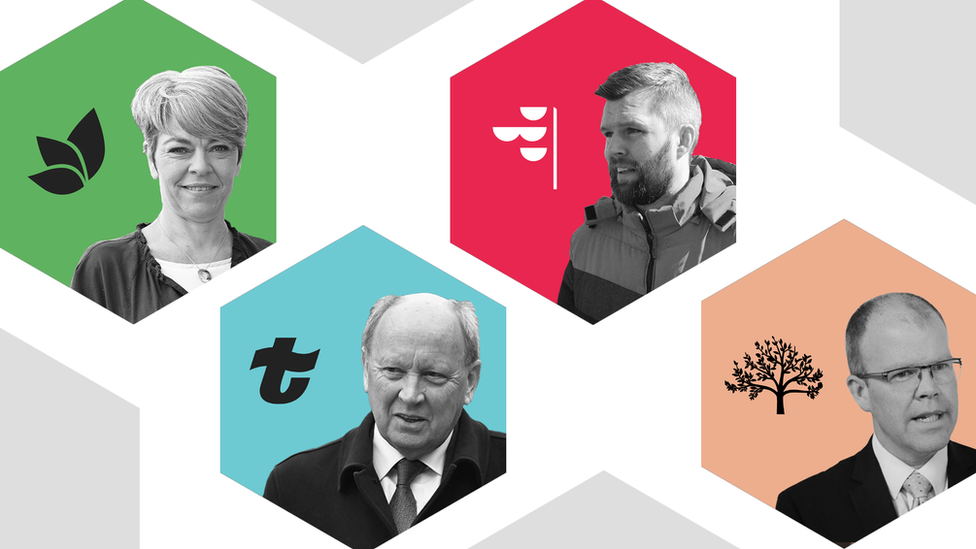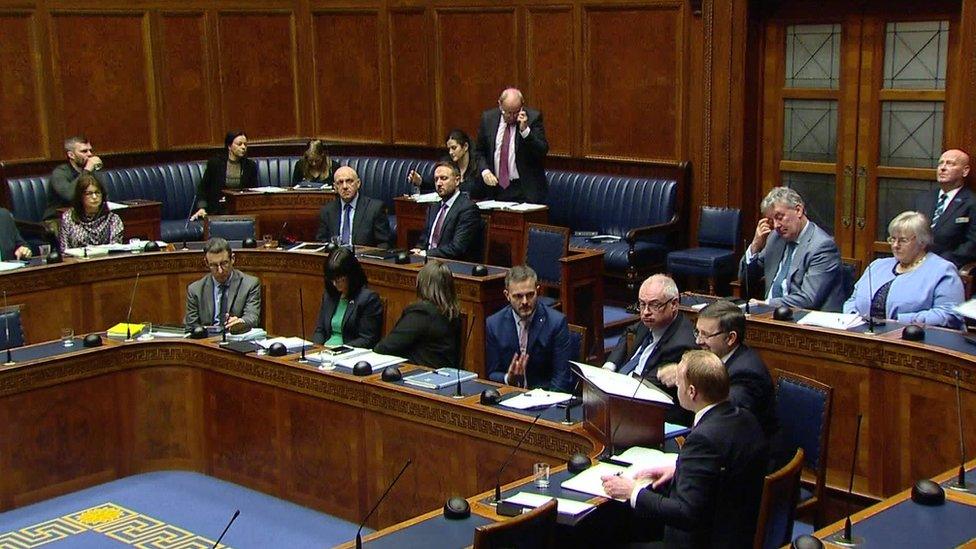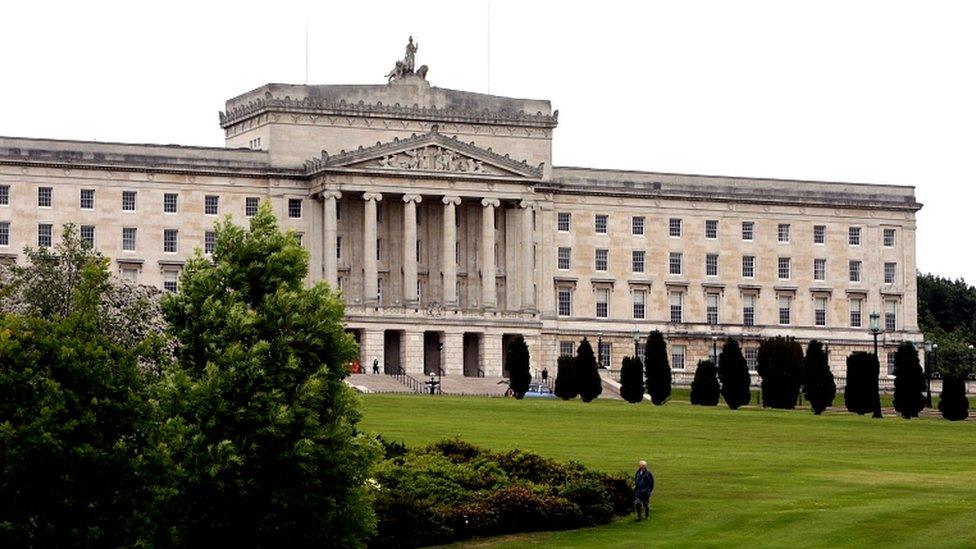NI election 2022: The smaller parties fighting to win seats
- Published

They've all sat in Stormont's so-called naughty corner - AKA the spot in the assembly chamber reserved for the smallest parties.
The Traditional Unionist Voice (TUV), Northern Ireland Greens and People Before Profit believe they've proved effective thorns in the side of the larger parties.
At times they've also been viewed as the opposition (albeit unofficially), challenging executive policy and bringing their own legislation.
But what chance have each of them got to increase their vote next week?
And what chance has Aontú - the all-island anti-abortion party - got of joining them?
The Green leader Clare Bailey fancies her chances at seeing a Green trio in the assembly.
This is her first assembly election as party leader, but she hopes to build on the success of 2019's council elections when the Greens doubled their seats on council across Northern Ireland from four to eight.
Since then, she has focused her party's efforts on legislation and points voters to that when they ask what a Green assembly member (MLA) can do for them.
Ms Bailey also drew attention when she faced down opposition last month over her bill to ban anti-abortion protests outside health settings.

SIGN UP FOR ALERTS: Get extra updates on BBC Northern Ireland election coverage

The Democratic Unionist Party and TUV, who were not in favour of the legislation, had hoped to block it but when that failed, Ms Bailey got up and bluntly said she was "scundered" for them, accusing the parties of trying to thwart progress on "healthcare issues".
The party is again running 18 candidates in this election - half of them women as the party uniquely maintains a quota to ensure 50:50 gender balance for candidates.
But will the Greens simply be having a good day if they match the previous result of two seats at Stormont?
The party's other outgoing MLA Rachel Woods, who is standing again in North Down, said she would love to see "18 Green MLAs" and did not limit her ambitions.
"People want an alternative and that's what we're offering - we have a good chance, we've shown what we can do with two MLAs, imagine what we can do with more," she said
Then take the TUV leader Jim Allister.
Having quit the DUP to form his own, more hardline unionist party 15 years ago, supporters believe his chances have never been better.
His loud stance against the Northern Ireland Protocol pushed the DUP into a tight corner and undoubtedly increased pressure on the party to collapse the institutions in February.
He has also been front and centre of anti-protocol rallies that have taken places across Northern Ireland in recent months.

The "naughty corner" at Stormont features a wide range of views
The party is running 19 candidates in this election - one in each constituency bar North Antrim, where Mr Allister is standing again along with a running mate.
Add into the mix some recent polling that cast a boost in TUV fortunes, and the party feels the stage has been set for its best-ever assembly result.
But can it finally take the DUP "down, down, down" - something Mr Allister pledged was coming as far back as 2008?
While he is a sharp operator, critics and rivals point to other party candidates as relatively unknown.
To tackle that this time, the party is redesignating as "TUV - No Sea Border" on the ballot paper - a reminder of its top priority.
But the TUV leader said if he returned to Stormont as a lone voice again, it would be a failure not just for him, but the wider electorate.
"It will be a route of continuing the shambolic operations at Stormont, where you can't vote a party out of government and it would be an endorsement of sorts of the iniquitous protocol - I don't think people are going to do that," he told BBC News NI.
People Before Profit's Gerry Carroll first got elected to Stormont nearly six years ago, topping the poll in his home constituency of Belfast West - a result few saw coming.
Since then, the party has had mixed fortunes - its second MLA, veteran civil rights campaigner Eamonn McCann, lost his seat just 10 months later in the 2017 snap election, leaving Mr Carroll solo at Stormont.
The socialist party also appeared to be struggling to break into other constituencies.
In 2019, like the Greens, it got a boost in council elections, rising to five seats from just one previously.
That may account for the party running a record number of candidates in this election - 12, with seven of them female.

The TUV, Greens and People Before Profit have seats at Stormont, while Aontú are hoping to join them
Mr Carroll and his colleagues believe the cost-of-living crisis and stalemate at Stormont is leading people towards his party in greater numbers.
At his party's manifesto launch in Foyle, where the party hopes to regain the assembly seat it lost in 2017, he joked that he hoped there would soon be a "few more socialists making the naughty corner a bit louder".
But is that a realistic prospect, when People Before Profit took just 1.8% in overall vote share last time round?
The party's Foyle candidate Shaun Harkin said it was about ensuring the party "keeps building" its support, even if that does not necessarily translate immediately into more seats.
"Politics is changing right across this island, people are increasingly frustrated with a system that is rigged in favour of elites and the politically-connected," he added.
One of the smaller parties entering this race is not like the others - Aontú didn't even exist as a political party at the last assembly election.
Its founder Peadar Tóibín set up the all-island party in 2019 after quitting Sinn Féin because of that party's decision to change its policy on abortion.
It has two councillors, but this will be its first test at the Stormont ballot box.
The party is opposed to abortion in all circumstances and is hoping to take ground from the bigger nationalist parties, which take different stances on the issue.
It is running 12 candidates in the election, but Mr Tóibín - who is a TD (member of the Irish parliament) is not a candidate.
He said he had recruited candidates from "all backgrounds" who are truly committed to seeing Stormont's institutions reformed - and that the party believed MLAs who do not "do their job" shouldn't get paid.
"How many of us would be able to ring our boss to say we're not coming in to do our job and still get paid? That's exactly what the DUP are doing - it's an incredible situation," he added.
Mr Toibin suggested his party - while still wet behind the ears - was in contention for seats in four constituencies next week, something he put down to nationalist voters wanting a change from Sinn Fein and the SDLP.
"We believe without a shadow of a doubt due to the level of organisational development we've put in, we will be properly competing," he said.
So can these smaller parties all punch above their weight this time around?
We really don't have long to wait to find out whose efforts have paid off.

POSTCODE SEARCH: Who is standing in my area?
POLICY GUIDE: Who should I vote for in the NI Assembly election?
NORTHERN IRELAND: Essential guide to the Northern Ireland election
NOTIFICATIONS: Sign up for Northern Ireland election alerts

- Published14 April 2022

- Published4 May 2022

- Published8 April 2022

